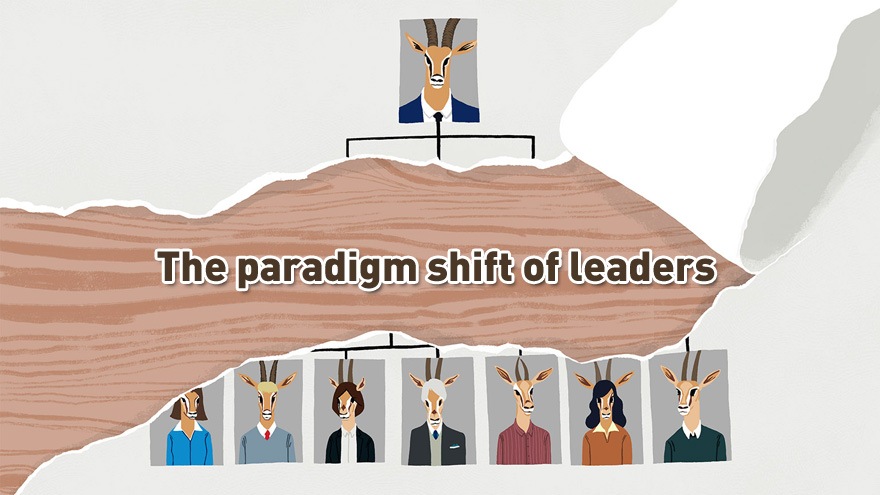The paradigm shift《典范转移》:是纪录片High performance leadship《高效管理和领导力》的第二章,7分钟时长。因此我们以视频号长视频的方式做了发布,这段剪辑以管理大师以及商业领袖的视角,向观众展示了未来管理与领导人所面临的机会及挑战,以及各种管理模型和体系的转变及创新。

名词解释:A paradigm shift (典范转移、范氏理论,亦被译作思角转身) is defined as “an important change that happens when the usual way of thinking about or doing something is replaced by a new and different way. 我们可以认为典范转移是常规科学中所有的理论,方法论,规则,应用等集合在一起的模式,或者叫pattern。对于某种科学领域来说,典范转移动的出现和建立就标志着学科的建立,随之而来的将是一种颠覆式的转变。
1–I think the leadership requirements over the next ten years are gonna be very challenging 我认为未来一年对领导力要求将是非常具有挑战性的
2–and to some extent quite different from the past. 而且在某种程度上与过去有很大不同
3–You know, we are living in quite turbulent times. 我们生活在相当动荡的时代
4–We all know that I think what’s more critical to understand or at least, accept is 众所周知,重要的是理解或者至少是接受
5–there is a big pre-tectonic shifts 一个巨大的结构性转变,
6–as if gravitational forcesis underway. 就像承认地球引力在发生一样
7–The rise of the East of the emerging markets versus the West, 新兴市场的东方崛起与西方抗衡,
8–The plethora of technology and what that’s doing, 过多的技术和使用,
9–The disruptions, the opportunities and so forth that’s going on破坏、机会等等,
10–which we’re seeing literally on a day to day basis. 我们每天都能看到的
11–The aging population, the scarcity of resources, 人口老龄化、资源短缺,
12–there is each one of these is massive in itself, 每一项都是巨大的问题,
13–and they’re all happening together. 它们都是同时发生的
14–So I think which we have to accept, 所以,我认为我们必须接受,
15–we’re living in a very volatile period, 我们生活在非常不稳定的时期
16–As, as we shift to into this new century. 当我们进入新世纪的时候
17–You go down through history and look at people who, everyone talks about, as a great leader回顾历史,看看那些人人都在谈论的伟大领袖
18–They don’t talk about that stuff, 他们不谈论那些东西
19–they talk much more about the vision. 他们更多地谈论愿景
20–They talked much more about people believing and buying into that vision, 他们更多地谈到人们相信并接受这种愿景,
21–Often through various methods of communication, 经常通过各种沟通方式,
22–they talk a lot about energy and empowerment and motivation and inspiration. 他们谈论了很多关于能量来源、能量传递、动力驱动和员工激励的话题
23–And if you ask yourself, 如果你问自己,
24–what if management can not run this organization如果管理对这个团体不起作用怎么办?
25–Shouldn’t be able to function is too big, too spread-out, too complicated. 应该不会因为摊子太大、人员太分散、结构太复杂而无法运作
26–What leadership tends to do it? 领导者通常会怎么做?
27–It tends to be much more at the heart of creating things in the first place它往往是在创造事物
28–or changing them in significant ways或以重要方式改变事物,
29–to take advantages of opportunities or to dark hazards, 抓住机会或孤注一掷,
30–or to take a group. 或者选择一组
31–and literally the same people. 实际上是同一群人
32–Getting them to pay and behave in new and different ways of produce much much much better outcomes. 支付给他们不同的薪水,让他们焕发出崭新的面貌,从而产生更好的结果
33–This time around the challenges on leaders everywhere, 目前,世界各地的领导人都面临着挑战
34–and they thought underneath this is that他们认为,在这背后
35–we live in a world where never before has leadership been so necessary, 我们生活在一个领导力从未如此必要的世界
36–so needed but we were so often, 如此急需,但我们往往发现
37–leaders seem to come up short. 领导者们似乎还很匮乏
38–our sense is this is not really a problem of individuals. 我们的感觉是,这真的不是个人的问题
39–This is a problem of organizational structures. 是组织结构的问题
40–Those traditional, pyramid structures那些传统的、金字塔型的等级结构,
41–that demand too much of too few and not enough to everyone else. 对少数人的需求太多,对大多数人又要求不够
42–And the old command control that grew out of the military and was successful in the fifties and sixties旧的指挥和控制方式源自军队,并且在五六十年代取得了成功,
43–started to erode in the seventies and totally collapsed in the eighties. 在七十年代开始走下坡路,在八十年代彻底崩溃
44–I came about because we had a military structure that we know, 我这么认为是因为我们熟悉军事构架
45–and we had no Japan and no Germany as competitors, 我们没有日本和德国作为竞争对手
46–so it works for twenty years and became the model. 20年来,它一直是一个典范
47–and so that had taken out. 我们因此必须把它拿掉
48–And now, 现在
49–Most organizations that are successful today, the quality of an idea, determines大多数成功的组织,都是由一个想法的质量
50–whether it’s adopted or not, 是否被采纳,
51–not where it came from in the organizational hierarchy. 不取决于它是不是来自领导层
52–People have to be able to energize and excite those in the organization必须能够激励组织中的员工,
53–to reach for new heights, 使他们达到新的高度
54–and they have to ask them to contribute to each other and almost two dozen of favors, 必须让他们互相协助
55–while if you have all individuals playing, 如果每人都可以演奏出,
56–beautiful music. 优美的音乐
57–but that doesn’t come together. 却无法汇合成一首乐曲
58–you really have to be a conductor, 所以,你必须是个指挥家
59–a motivator, an energizer, a cheerleader, and you’ve got to bring people together. 一个激励者,一个推动者,一个啦啦队长,你必须把人们团结在一起
60–It’s important for leaders to realize that重要的是,领导者要意识到
61–its leading is really more than just directing people and telling you what to do. 领导不仅仅是指挥别人,告诉他们如何做
62–That is a type of leadership, 这是一种领导力
63–but it doesn’t tend to be the most constructive. 但它往往不是最有建设性的
64–What we found working with human synergistically is there are我们在与人协同工作时发现,
65–constructive leadership styles that were more affiliative. 有建设性的领导风格被关联在一起
66–There were self-actuating. 他们自我驱动
67–They’re more achievement-oriented. 他们更注重成就
68–All those things are positive, 所有些都是积极的
69–positive leadership models. 积极的领导模式
70–So if you’re not using those leadership can be pretty tough. 如果你不使用些领导能力会很困难
71–it can be really hard. 真的很难
72–It can’t be a grind. 可能是令人煎熬的
73–If you, you start moving into the positive realm and you can replicate that with the rest of your team, 你的领导方式切实可用,就可以扩大在其它的团队成员中的使用
74–they can make a terrific difference. 他们可以产生巨大的影响
75–So that’s so hard as it is. 如此艰苦的生活
76–If you feel like, 如果你喜欢
77–you’re slogging through mud, 你在泥泞中跋涉
78–it’s energized, it’s actually a lot of fun. 它充满活力,实际上也很有趣
79–And a good leader at one position may or may not be a good leader at another position. 一个在一个职位上的好领导,可能在另一个职位上可能不是好领导
80–Companies change, expectations change公司变了,期望也变了
81–people change. 员工变了
82–You can’t make an assumption that great Leader X First line supervisor is going to be a great CEO, 你不能假设一个伟大的领导者如:一个一线主管将会是一个伟大的CEO,
83–and you can’t make the assumption that a great CEO in one company你也不能假设一个伟大的CEO在一家公司
84–is necessarily going to be a great CEO in another company. 一定会成为另一家公司的伟大CEO,
85–That doesn’t always work. 它并不总是有效的
86–Does the person fit that situation? 人适合新的岗位吗
87–And a history of leadership research领导力研究的历史
88–has focused primarily on the leader in western societies in the United States. 主要关注的是美国的西方社会领导人
89–In much of Europe, 在欧洲大部分地区
90–the focus of leadership studies has been primarily on the leader领导力研究的焦点主要集中在领导者身上,
91–and seeing the leader as the cause of moving the group or the collective to action. 并将领导者视为推动团队或集体行动的原因
92–But more recently, 但最近
93–in leadership studies is a focus on the follower在领导力研究中,关注的是追随者,
94–because we know that leadership really is not done by the leader. 因为我们知道领导力真的不是由领导者完成的
95–That leadership is co-created by leaders and followers working together. 这种领导力是由领导者和追随者共同创造的
96–So followership is a new topic that’s emerging in the study of the追随者船是研究领导者时出现的新话题
97–Leader-follower relationship. 追随者的关系
98–And one of the things that we know is that followers play an important part, 我们知道的一件事是追随者在其中扮演了重要的角色
99–not just in executing the goals of the group or the collective, but followers, can play a big part不仅是在实现团体或集体的目标方面,在追随者方面,它都可以发挥很大的作用
100–in terms of assisting the leader in the leadership. 在领导方面协助领导
101–what we call co-creating leadership. 我们称之为协同领导力
102–And the only way you can find out, is to find out what the followers think of the leadership. 而你能找到答案的唯一方法,就是找出追随者对领导的看法
103–The leadership comes through the support that the boss provides, 领导力来自于老板提供的支持
104–and the only way to find out how good that support is. 只有样才能知道这种支持有多好
105–whether he’s really, I mean, on my leading toward being dishonest somehow? 他是否真的,我是说,由于我的领导而变得不忠诚?
106–Am I leading them toward really caring about the work? 我是否引导他们真正用心工作?
107–How am I leading? Well, 我怎样才能领导得好
108–you go down and ask the employees, 你去问员工
109–Am I helping you? 我在帮你吗?
110–Are the tools good enough? 这些工具够好吗?
111–Was the training good enough? 培训足够好吗
112–What is disrupting you? 是什么扰乱了你
113–How can I do better for you? 我能为你做些呢?
114–How can I improve my support? 我该如何改善我的支持?
115–And they will start telling you they will tell you everything about it eventually, 他们会告诉你,他们最终会告诉你一切,
116–if they learn to trust you because you really take the appropriate action. 如果他们信任你是因为你真的采取了适当的行动
117–But followers also play an important part in keeping the leader’s behavior in line, 但追随者在约束领导者行为方面也发挥着重要作用
118–Particularly when the leader is headed down the wrong path. 特别是当领导者走上错误的道路时,
119–It’s the role of the followers to check the leader, and to be sort of a reality check, 追随者的角色是检查领导者,是一种现实检查,
120–and help the leader to get back on the right path. 帮助领导者回到正确的道路上





